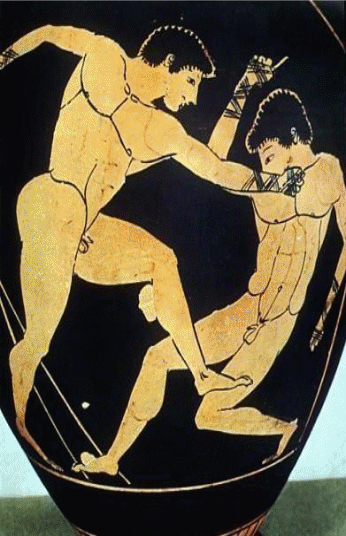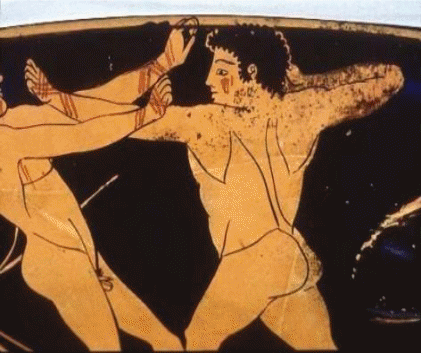Some fundamentals of sports competitions in Ancient Greece
First of all, I would like to point out that sports competitions in Ancient Greece started very long ago. They say that the modern Olympic Games appeared in the 8th century BC. The most well-known cities where the competitions took place were Delphi and Olympia. In Ancient Greece typical competition program included such kinds of sports as wrestling, pentathlon, and horse riding. However, foot races were also common kinds of sports. The wreath was the symbol of the winner, so, such an arrangement of flowers and leaves was also used as an award. Ribbons as well as palm fronds were also associated with Victory; so, one can conclude that these items were also used as prizes.
I suppose that everybody has heard about the Panhellenic Games. These Games included Pythian Games, Isthmian Games, and Nemean Games. “These Games were special because they brought the Greek world together at a time when Greece was not a single state, but a series of city-states (politically and economically independent communities)” (“Olympic Museum and Studies Centre,” 2002, p. 2). Of course, Games in Ancient Greece had religious significance. Thus, sports competitions were held to worship such gods as Zeus, Apollo, and Poseidon.
Boxing
So, the kind of sports I’ve decided to disclose is boxing. Generally, I would like to compare modern boxing and boxing in Ancient Greece. Of course, there were no boxing gloves in Ancient Greece; however, the fighters had an opportunity to protect their hands. Thus, special leather thongs were used instead of gloves. In our day’s numerous modifications appeared. However, I have to say that boxing was more cruel and violent in Ancient Greece.
The fighters’ thongs contained numerous pieces of metal. In other words, “A boxer’s victory is gained in blood” (Murray, n.d., p. 9). While speaking about the major differences between Greek boxing and contemporary one, there is a need to point out that there were no weight classes between the fighters as well as no rounds. So, “to win a boxer must either knock out his opponent or force him to submit; one would signal capitulation ad digital by raising a single finger” (Murray, n.d., p. 9). The picture below reflects this process:

It is necessary to point out that there are still many contradictions concerning the fighters’ punishment. For instance, it is still unknown whether the officials could beat those who broke the rules or no. On the other hand, there is an opinion that the officials could whip the fighters if there was a need. It is difficult to say that boxing was a gentlemanly contest. On the contrary, a contemporary fighter would be horrified by the violence ancient boxers brought.
When speaking about some common features between Ancient Greek boxing and modern one, there is a need to point out that ancient boxers were also highly trained and well-skilled. In other words, only a well-conditioned boxer could succeed. Poliakoff (1987) is of the following opinion, “To say that victory in ancient boxing depended on brutality alone would be a great exaggeration, for the sport required a high degree of skill and strategy in addition to courage and fortitude” (p. 68). So, I suppose that one of the rules didn’t undergo any modifications. In other words, a boxer is to be strong and well-trained.
However, another interesting point I would like to highlight is that not every boxer used thongs. In our days, it is difficult to imagine that the boxers can fight without gloves; anyway, in Ancient Greece, the unwrapped hand was not a sensation. For this reason, one can understand the advantages of contemporary boxing. Now there are certain standards and rules, which allow the boxers to be out of danger as compared with the rules of Ancient Greece.
On the other hand, I want to draw the readers’ attention to the fact that leather thongs were recognized to be a defensive weapon. One more interesting issue is that the fighters competed in the nude. However, one can state that leather thongs could be a synonym with clothing. So, leather thongs are considered to be the first boxing gloves Greek fighters used; later such gloves or thongs were called bimantes. Of course, I have already said that ancient Greek gloves were used as a defensive weapon; however, one is to keep in mind that the secondary purpose of thongs was to inflict damage on the opponent.
“The leather would cut into the skin of the opponent. They would very often land a blow in the head, and there would be blood dripping all over, and they would fight on and on” (Haffner & Lusitant, 1996). So, one can conclude that the cruelty of a blow increased, and for this reason, ancient gloves can be regarded to be offensive weapons. The damages are reflected below:

In my opinion, boxing in Ancient Greece gave rise to contemporary boxing. Anyway, boxing is an ancient kind of sport.
Wrestling
So, another popular kind of sports in Ancient Greece I want to introduce you to was wrestling. Generally, there were five sports events, which were included in the category pentathlon. These events were “running, jumping, discus throwing, javelin throwing and wrestling” (“Olympic Museum and Studies Centre,” 2002, p. 9). A similar feature between modern wrestling and ancient one is that the athletes’ primary aim was to throw the opponent on the ground.
So, you see that the major rule is still considered to be the same. “Biting was not allowed, and genital holds were also illegal. Attacks such as breaking your opponent’s fingers were permitted” (“Ancient Olympic Events,” n.d., para. 1).
They say that another name for wrestling in Ancient Greece was pankration. It appeared in 648 BC. The original meaning of pankration is all powers. I’ve heard that the term pankration was used not only to denote wrestling, but the term was also appropriate to denote boxing. Thus, there were two kinds of sports the word was used for. They say that wrestling was also associated with the Ancient Greek military. Submissions, strikes, and takedowns were the most important techniques the fighters used. Generally, one can conclude that ancient wrestling has more features in common with the modern sport than ancient boxing with contemporary boxing.
On the other hand, it is obvious that in Ancient Greece the rules were simpler than those which are in effect in our days. When fighting, the fighters couldn’t bite. The officials could use a rod to punish the fighter who violated the rules. In my opinion, such methods of punishment can’t be compared with numerous modern methods referees use to stop wrestling or disqualify one of the fighters.
Even though wrestling was brutal in many aspects, this kind of sport was the most prominent in Ancient Greece. One of the most interesting points I would like to highlight is that wrestling in Ancient Rome appeared due to wrestling in Ancient Greece. In other words, Roman wrestling contained various features of Ancient Greek wrestling, although the Roman sport was not as brutal as the Greek one.
The most well-known wrestlers in Ancient Greece were Milo of Croton and Titormus. When fighting, the wrestlers were also naked. Generally, they say that Ancient Greek athletes wanted to show their physical prowess. On the other hand, we shouldn’t forget about the most important viewers I was talking about earlier. So, the fact that the fighters worship Zeus, Apollo, and Poseidon, gives us the right to state that the wrestlers wanted to show the gods how trained their bodies were. There is also an opinion that “An athlete’s physical perfection could also be intimidating to his competitors, and external beauty represented each competitor’s internal beauty and demonstrated their desire for a balance between body and mind” (“Ancient Olympia History,” n.d., para. 1).
Running
So, another popular kind of sport is running. First of all, I would like to point out that running or foot race is recognized to be one of the most ancient kinds of sports competitions. As far as the form of athletic competition is too ancient, it is impossible to state the exact date of its origin. The most interesting fact, however, is that children studied running as a science. In other words, children had to study the techniques of the form of athletic competition as well as its philosophy.
Running as well as wrestling belonged to the pentathlon. Generally, the kind of sports is mostly associated with myths. Thus, the most well-known legend is about Heracles who won a foot race during sports competitions. So, later, foot races were held every four years. Moreover, I have to say that foot races were also devoted to Zeus.
I think it is obvious that various sports competitions are closely related to the strength of the mind. Those, who took part in foot races, were physically strong. On the other hand, military efficiency in Ancient Greece also depended upon various athletic contests. We are to take into account different times. However, I suppose that various forms of athletic contests demonstrate the power of the countries whose participants take part in numerous competitions.
Here especially the exercises of running, leaping, wrestling, and throwing the spear and the discus were brought to perfection of style which was afterward universally adopted among the Hellenes: here fixed ethical rules were first introduced, which excluded every wild passion and enjoined the the strictest obedience to the laws of the contest as a duty: here the principle of forbidding the youthful ambition to be desecrated by any consideration of gain was established: here finally came into use, in contrast to the flowing robes of the Ionians, a short and light dress for men, which was to promote the health and agility of the body, and form a transition to the state of complete nakedness which was introduced in the exercises of the young (Curtius, 1971, p. 33-34).
Reference:
Ancient Olympic Events. (n.d.). Wrestling. Web.
Ancient Olympia History. (n.d.). Athletic Contests. Web.
Curtius, E. (1871). The History of Greece (Ward, A. W., Trans.) (Revised ed.) (Vol. 2). New York: Charles Scribner’s Sons. Web.
Haffner, C. and Lusitant, D. E. (Executive Producers). (1996). Blood and Honor at the First Olympics. [Motion Picture]. United States: Greystone Communications, Inc.
Murray, S. (n.d.). Boxing Gloves of the Ancient World. Web.
Olympic Museum and Studies Centre. (2002). The Olympic Games in Ancient Greece. Web.
Poliakoff, M. B. (1987). Combat Sports in the Ancient World: Competition, Violence, and Culture. New Haven: Yale University Press. Print.